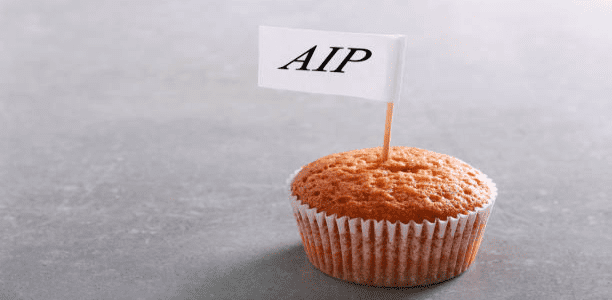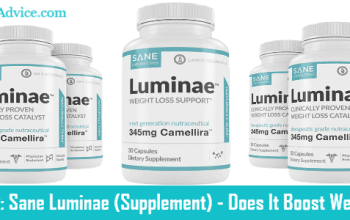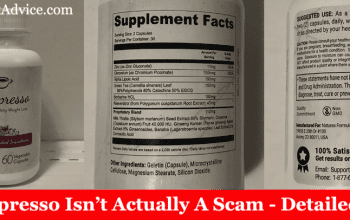
Is AIP Diet dangerous for promoting weight loss?
What nutrient deficiencies does it lead to? What about the potential side effects?
In this article, we're going to talk about the risks this diet comes with:
- side reactions
- treatment interactions
- nutritional deficiencies
If you're curious about the negative side of this diet, you're in the right place.
So let's look at the risks and dangerous of AIP diet.
Note: This article includes references and studies related to the AIP diet and its negative effects.
Is AIP Diet Dangerous? (In A Nutshell)
The AIP diet is a restrictive dietary protocol designed for people with autoimmune conditions.
It involves eliminating different food groups that might cause inflammation in the body.
The goal is to find which food type is connected to an increase in your symptoms.
Once you find that out, you can then give up that food completely.
Now – some people may experience several benefits from this diet.
But just like any restrictive regimen, there are also a lot of risks you need to consider:
- Gut dysbiosis
- Micronutrient deficiencies
- Hypoglycemia
- Fatigue
- Mental health issues
- Disordered eating patterns
To give you an idea – you need to remove grains, legumes, dairy, eggs and nightshade vegetables.
We all know that those foods are good sources of essential nutrients.
Although there are still other nutrient-dense foods allowed in the diet, they might not be enough.
Now – nutritional deficiencies are not the only potential problems with AIP.
That's because it requires a sudden change in diet.
Consequently, your body might find it hard to adjust to it:
- psychological issues
- social and emotional problems
- general health concerns
Just like other types of dietary approaches, you should not try AIP without being fully informed.
If you are experiencing autoimmune conditions, it's very important to seek professional advice.
In that way, you can see if the diet is suitable for your health (or not).
Again, it's a personalized type of diet plan and it's not the same for everyone.
Overall – AIP comes with a promising approach, but it's not free from negative effects.
The Dangers Of AIP Diet
Now, you probably know the basics of AIP Elimination Diet by now.
But let me give you an overall view on this diet [1]:
- designed for people with autoimmune conditions
- has 3 major phases (Elimination, Reintroduction and Maintenance)
- its main goal is to remove foods that cause inflammation and worsen your symptoms
Although the diet may provide relief for some individuals, it has some potential dangers too.
That's because of the elimination of some entire food groups and other restrictions.
So let's take a look at the possible negative effects of this diet below.
#1 – Micronutrient Deficiencies
Again, the major highlight of the AIP diet is to remove food groups at the start of the process [2].
Thus, the trigger foods should be identified (once they are reintroduced one at a time).
However – this step can also cause several nutrient deficiencies.
With that being said, here are nutrients that can be affected by eliminating some foods:
- removing dairy products can lead to vitamin D and calcium deficiency [3] [4]
- elimination of grains and legumes might cause low iron and fiber [5] [6]
- giving up eggs, dairy and fortified grains can lead to vitamin B12 deficiency [7]
- zinc deficiency can also appear due to a lack of legumes in the diet [8]
In addition, here are the effects of the nutrient deficiencies above [9] [10] [11]:
- weak bones and teeth
- poor immune function
- digestive issues and constipation
- increased risk of infections
- nerve damage and intellectual impairment
- troubled breathing and palpitations
- longer time for the wound healing
As I mentioned before, the AIP diet should be followed with proper medical guidance.
A doctor can make sure that you avoid these deficiencies.
It's crucial to have the right nutrients in the right amount (especially when you're dealing with an autoimmune condition).
But overall, the point is that the AIP diet can influence the level of your nutrients.
#2 – Hypoglycemia
Since AIP is a restrictive diet, you will be forced to eliminate certain groups of foods.
Some of the most common ones are:
- grains and legumes
- processed foods (refined sugar and artificial sweeteners)
But how does removing these foods affect your glucose levels? [12].
Well – it can mostly happen if you're already suffering from diabetes.
Carbohydrates play an important role, since they are the sources of glucose [13].
The foods above are some major carb sources.
So removing them can lead to a low blood sugar, in some cases.
Now, there are many other sources of carbohydrates (fruits and vegetables), that's true.
But they might not be enough at times.
If your body is used to a high amount of processed sugar, giving it up all of a sudden might be harder than you think.
With that being said, here are the common symptoms of hypoglycemia [14] [15]:
- sweating and fast heartbeat
- shaking and dizziness
- anxiety and nervousness
- irritability and confusion
- nausea or headache
- weakness and hunger
- blurred vision and seizures
Again – there are a lot of ways to avoid hypoglycemia.
First of all, you should follow your prescribed treatment correctly.
Additionally, you can also try a professional blood sugar supplement (but only high-quality ones are worth it).
But removing the basic source of glucose (carbohydrates) can give a huge impact on your health [16].
For this reason, you can try replacing your usual sugar sources with honey and fruits.
Even though they're very sweet, most of them don't raise blood sugar.
Sure enough – not all of them are ideal for diabetes.
That's why you should ask for your doctor's approval before trying this diet
#3 – Gut Dysbiosis
Now – let's define first what gut dysbiosis is, so that you can understand it further.
Well, it refers to the imbalance of microbiota in the human digestive system [17].
In this case, the bad bacteria can outnumber the beneficial ones.
Here are the reasons why gut dysbiosis can appear when following AIP diet:
- you have to restrict your fiber consumption (grains, legumes and other plant-based sources) [18] [19]
- some types of fiber are considered prebiotics
- limiting them can cause digestive problems [20]
So what happens if you have gut dysbiosis?
Here are the common symptoms you will likely experience [21] [22] [23] [24]:
- constipation, bloating, gas and IBD
- indigestion, diarrhea and abdominal pain
- food intolerance that can lead to allergies and infections
- weakened immune system
- skin issues like acne, rosacea and eczema
- chronic fatigue and (other) autoimmune problems
Just like other nutrients, it's also important to include fiber and prebiotics in your diet.
Overall – gut dysbiosis can appear in some people trying the AIP diet.
I mean, it won't happen in all cases, so don't panic – you may not even experience any small imbalance.
But the risk of it definitely there.
#4 – Fatigue
A significant change in diet can cause different reactions in different people [25].
One of them is fatigue and here are the reasons why AIP can trigger it [26] [27] [28]:
- your body needs to adjust to sudden diet restrictions
- some foods that are good sources of energy are eliminated
- they include refined sugar, grains, legumes, dairy and nightshade vegetables
- the potential impact on calorie intake can also be drastic
Consequently, your body adapts to all these sudden changes by giving you less energy.
So what are the signs that you're experiencing fatigue? [29]
It's not all about feeling tired or falling asleep faster:
- extreme tiredness or exhaustion
- sore and aching muscles
- difficulty concentrating
- lack of energy to complete even simple tasks
- poor sleep quality and headaches
- weak immune functions
- hallucinations and blurry vision
Again, a calorie deficit is just as bad as an excess.
If you don't have a good amount of calories, your body will break down your muscle tissues [30].
Your muscles will then be used as fuel to provide energy for proper functions [31].
Guess to what this leads? You're right – weakness, low energy and fatigue.
Not to mention the consequences of combining the AIP diet with intense workouts.
Overall, if you're experiencing consistent fatigue while on this diet, it might be a sign that it's not suitable for you.
#5 – Eating Disorders
Another negative effect of the AIP diet is disordered eating [32].
Again, this type of dietary approach is very restrictive.
But keep in mind that every individual is unique and may respond differently.
So now, here are the ways in which the AIP diet can cause eating disorders [33] [34] [35]:
- a feeling of deprivation due to food restrictions
- developing a fear of trigger foods
- body image concerns because of how the diet is marketed to the public
In addition, here are the 3 main types of eating disorders [36]:
- Anorexia nervosa
- Binge-eating disorder
- Bulimia nervosa
An individual with a history of these conditions is more prone to experiencing it again [37] [38].
That's why it's very important to be physically and mentally ready before trying a new diet.
The AIP diet is far from simple.
So if you have a history of eating disorders, I'm not sure it's the right one for you.
You can definitely give it a try – but in your case, a doctor's advice is even more important.
So I don't recommend following this diet without medical advice.
#6 – Mental Health Problems
Lastly, the AIP diet or any form of diet can also take a toll on a person's mental health [39].
A sudden restriction on the foods that you eat can affect the way you view life.
It can also be challenging to adhere to social situations like dining out or parties.
Now, experiencing mental health issues due to the AIP diet is common.
It also has some pretty logical causes [40] [41]:
- loss of pleasure in eating
- obsessive focus and overthinking about foods
- deficiencies in vitamins and minerals can affect brain health
- social isolation
- restrictive eating patterns can cause stress, depression or anxiety
Now, here are the signs that you're having mental health problems [42]:
- intense mood swings for no apparent reason
- lack of motivation
- impaired ability to focus and concentrate
- insomnia and disrupted sleep
- unhealthy changes in weight
- emotional or psychological distress
- increased sensitivity and unusual behavior
Again – it has been established that not any type of diet is appropriate for everyone.
So always remember that your mental health is more important than losing some weight.
But if you really need a special diet to improve your autoimmune condition, you can always find a way.
Part of it is by consulting a healthcare professional first.
Final Conclusion

It can sometimes manage autoimmune conditions and several issues related to them.
However, there are also potential issues that you need to be aware of:
- Nutrient deficiencies
- Low blood sugar levels
- Gut issues
- Fatigue
- Eating disorders
- Mental health problems
Again – AIP comes with a lot of restrictions that many people might find hard to follow.
The top one is having to remove a lot of foods that make essential sources of nutrients.
This diet does promote nutrient-dense foods, but they may not be enough for some people
So these restrictions can affect a person's well-being.
In addition, these health issues can turn into long-term consequences.
That's why it's very important to consult a healthcare professional before trying the diet.
Again, it's not a one-size-fits-all type of diet.
Overall – it's better to do your research before trying to introduce it in your routine.
In that way, you can avoid the possible negative repercussions related to it.
References:
1 – https://www.ncbi.nlm.nih.gov/-pmc/articles/-PMC7147823/
2 – https://www.ncbi.nlm.nih.gov/-pmc/articles/-PMC5647120/
3 – https://www.ncbi.nlm.nih.gov/-pmc/articles/-PMC7353177/
4 – https://www.ncbi.nlm.nih.gov/books/-NBK56061/
5 – https://www.ncbi.nlm.nih.gov/-pmc/articles/-PMC9268622/
6 – https://www.hsph.harvard.edu/nutritionsource/-iron/
7 – https://ods.od.nih.gov/factsheets/-VitaminB12-HealthProfessional/
8 – https://www.ncbi.nlm.nih.gov/books/-NBK493231/
9 – https://www.rush.edu/news/-signs-nutrient-deficiency/
10 – https://www.ncbi.nlm.nih.gov/-pmc/articles/-PMC9710417/
11 – https://pressbooks-dev.oer.hawaii.edu/-consequences-of-deficiency/
12 – https://www.ncbi.nlm.nih.gov/books/-NBK534841/
13 – https://pubmed.ncbi.nlm.nih.gov/-29083823/
14 – https://www.cdc.gov/diabetes/basics/-low-blood-sugar/
15 – https://www.ncbi.nlm.nih.gov/books/-NBK534841/
16 – https://www.hsph.harvard.edu/nutritionsource/-carbohydrates/
17 – https://www.sciencedirect.com/topics/medicine-and-dentistry/-dysbiosis/
18 – https://www.sciencedirect.com/science/article/pii/-S193131281830266X/
19 – https://www.hsph.harvard.edu/nutritionsource/-microbiome/
20 – https://www.ncbi.nlm.nih.gov/-pmc/articles/-PMC3705355/
21 – https://www.ncbi.nlm.nih.gov/-pmc/articles/-PMC4566439/
22 – https://www.ncbi.nlm.nih.gov/-pmc/articles/-PMC4425030/
23 – https://pubmed.ncbi.nlm.nih.gov/-22314561/
24 – https://www.ncbi.nlm.nih.gov/-pmc/articles/-PMC9311318/
25 – https://healthcare.utah.edu/the-scope/-v5my9oc1/
26 – https://www.ncbi.nlm.nih.gov/-pmc/articles/-PMC6835556/
27 – https://www.ncbi.nlm.nih.gov/-pmc/articles/-PMC7071235/
28 – https://www.ncbi.nlm.nih.gov/-pmc/articles/-PMC5639963/
29 – https://www.betterhealth.vic.gov.au/health/-fatigue/
30 – https://www.ncbi.nlm.nih.gov/-pmc/articles/-PMC5161655/
31 – https://pubmed.ncbi.nlm.nih.gov/-22516719/
32 – https://www.nimh.nih.gov/health/publications/-eating-disorders/
33 – https://nedc.com.au/eating-disorders/-disordered-eating-and-dieting/
34 – https://www.ncbi.nlm.nih.gov/pmc/articles/-PMC5571485/
35 – https://news.illinoisstate.edu/2021/04/-social-media-effects-on-body-image/
36 – https://www.psychiatry.org/patients-families/-what-are-eating-disorders/
37 – https://www.psychiatry.org/patients-families/eating-disorders/-expert-q-and-a/
38 – https://nedc.com.au/eating-disorders/treatment-and-recovery/-relapse-and-recurrence/
39 – https://www.mentalhealth.org.uk/explore-mental-health/-diet-and-mental-health/
40 – https://www.ncbi.nlm.nih.gov/-pmc/articles/-PMC2738337/
41 – https://www.ncbi.nlm.nih.gov/-pmc/articles/-PMC2805706/
42 – https://www.psychiatry.org/patients-families/-warning-signs-of-mental-illness/












